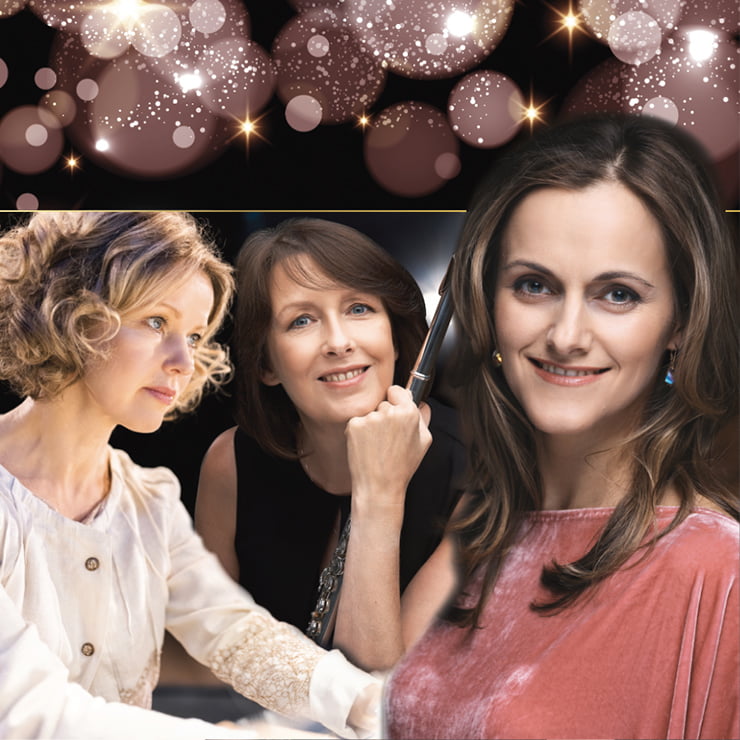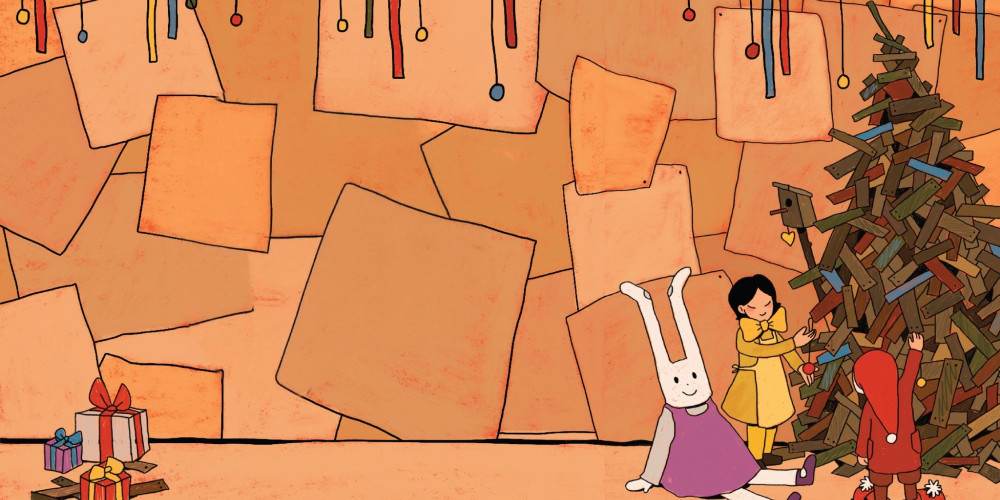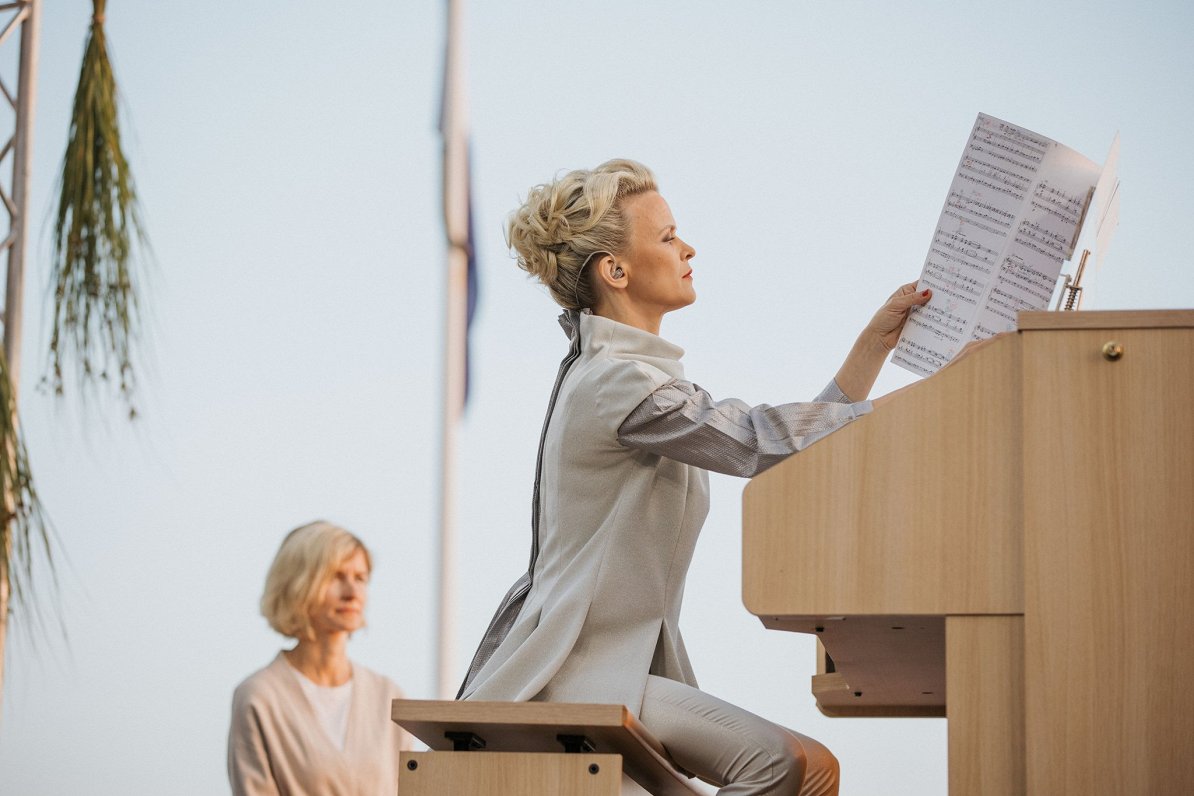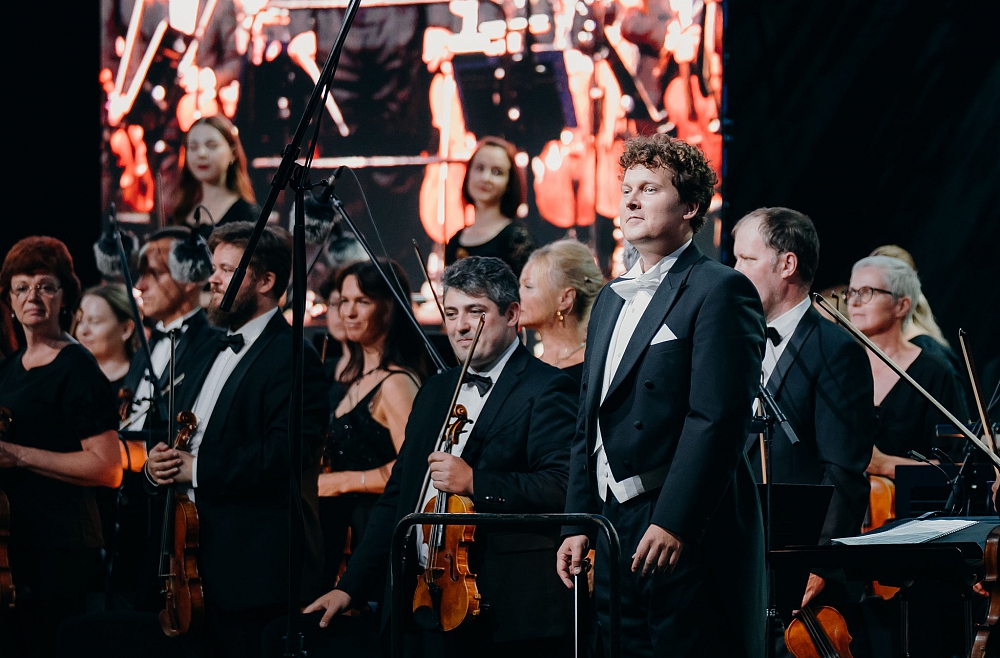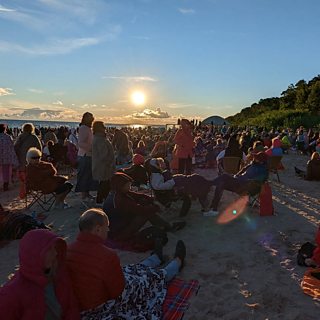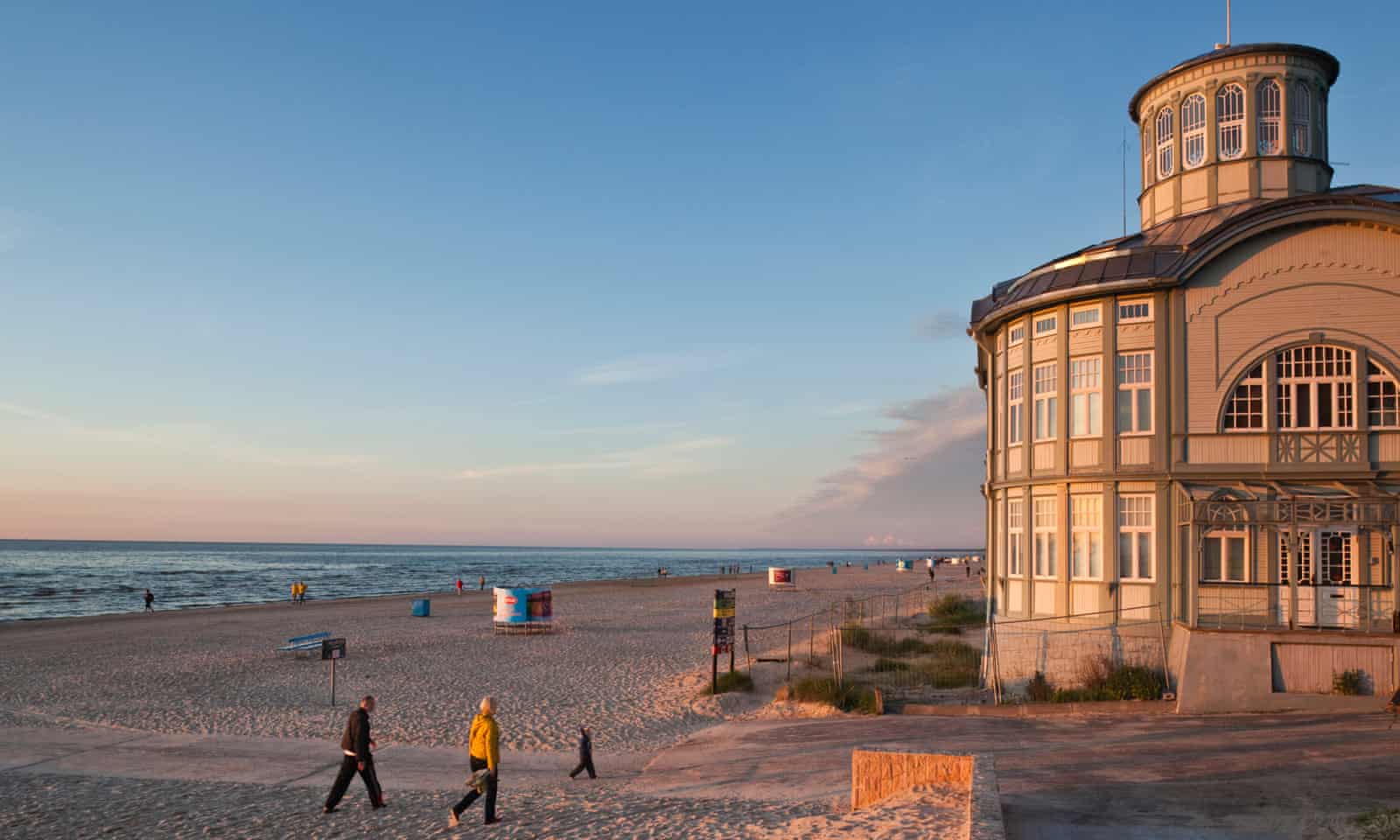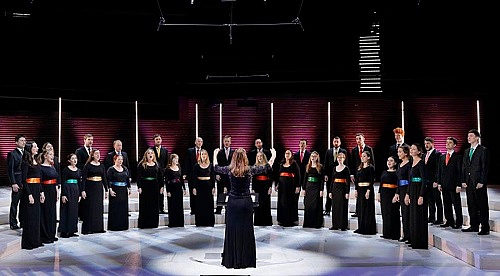Participants:
Gunta Gelgote, soprano
Ieva Pudāne, flute
Ilze Reine, organ
On 10 December at 5 p.m., the Silent Night, Holy Night concert will feature three great and well-known Latvian musicians – singer Gunta Gelgote, flautist Ieva Pudāne and organist Ilze Reine. The programme focuses on the Soul, Nature and God trinity, with the themes of silence, prayer and hope. The concert will feature works by Baltic composers from the Romantic period to the present day, united by melodicism and light moods.
We will hear fanciful opuses by Jānis Ķepītis and Ilze Arne, the poetic work “El mirollo de l’arbore” by Santa Ratniece, as well as works by Jānis Lūsēns and Romualds Jermaks. Prayer motives will be heard in the works performed by Aļģimants Kubiļūns, Maija Einfelde and Rihards Dubra, while a folk mood will be evoked with an organ miniature by Estonian classical composer Edgars Arro and a setting of Latvian folk songs.
THE PROGRAM
Romualds Jermaks (1931)
“Evening Melody”
Helmers Pavasars (1903-1998)
“In the evening” (text by K. Skalbe)
Lauma Reinholde (1906-1986)
“The distant kokle” (text by B. Skujeniece)
Jānis Lūsēns (1959)
“December”
Imants Zemzaris (1951)
“Winter peace” (text by K. Skalbe)
Algimantas Kubiliūnas (1939)
Ave Maria (”Hail Mary” text of the Catholic prayer)
Rihards Dubra (1964)
“The touch of Our Lady’s gaze”
Santa Ratniece (1977)
El mirollo de l’arbore (”The Heart of the Tree”, text by St. Catherine of Siena)
Edgar Arro (1911-1978)
Estonian folk song from the cycle “Estonian folk songs”
Pēteris Vasks (1946)
Dance
Austriņa/Liene Batņa (1976)
“A silver drop fell” (Latvian folk song text)
Jānis Ķepītis (1908-1989)
“Starry night” (text by J. Brežģis)
Maija Einfelde (1939)
Cantabile from Two Impromptu
Ilze Arne (1953)
“Holy night” (text by A. Eglītis)
Rihards Dubra (1964)
“About Bethlehem…”
“Sparkling candles” (text by J. Poruka)
Musicians about the chosen program: “Store quiet light for your soul” – it is these words of Kārlis Skalbes, which were put to music by Helmers Pavasars, that inspired the creation of the lyrically poetic concert program. The concert is based on the three big words “Soul – Nature – God!” The chosen music approaches them through awe, prayers and hope. Quiet light shines in the works of both Latvian and Lithuanian composers, who are united by romanticism, melodism and lyricism, bright moods and hope.”
The center of the works of the Latvian old master Romualds Jermaks is organ music and immersion in the depth of sacred feelings. His compositions are permeated with pastoral and neo-romantic moods, as we can also hear in “Evening Melody” for organ and flute.
Helmers Pavasars music grew out of finely nuanced folk intonations and rhythms. The composer’s work is a companion of Latvians in exile, a declaration of love for the homeland made in watercolor colors. His compositions have been performed at the main music events of Latvians in exile.
Along with Lūcija Garūta and Paula Līcīte, Lauma Reinholde is one of the most prominent Latvian composers of the 20th century. Dubbed a child prodigy, she performed at the piano at the age of five, eventually establishing a successful career as a pianist. A significant part of the work is dedicated to solo songs, which stand out with gorgeous piano accompaniments.
Jānis Lūsēns is a beloved Latvian composer who was once active in non-academic music, founded the ensemble “Zodiaks” and wrote a lot of theater music. Melodicly sincere, true in Latvian is the world of sounds of Luciens. The instrumental miniature “December” paints a contemplative snowy winter landscape in the sounds.
Imants Zemzaris captures illuminated, poetically delicate colors in his music, which are permeated by the warm simplicity of the composer’s handwriting. A miniaturist and observer who gives apt titles to his opus. In his vocal works, he speaks with flexible expression and chamber finesse.
Alģimants Kubiliūns is one of the most prolific Lithuanian composers of our time, who combines Lithuanian folk music and modern compositional techniques in his works. Lyrical episodes, outbursts of emotions in his works are balanced with a rational approach to the architecture of the composition. Kubiliūn’s vocal music has expressive melodic lines.
Rihards Dubra is a Latvian composer of the middle generation, whose creativity is closely related to sacred music. His compositions have both simplicity and depth, a subtle and felt approach to religious themes. When writing his music, the composer likes to use the technical techniques of Gregorian, Renaissance and Baroque music, thus creating his sacred space, where the modern meets the ancient.
Santa Ratniece is an unusual personality among Latvian composers, she is a traveler and researcher with an original handwriting. Santa’s music is procedural – time-space in her works expands like an illuminated horizon. In the composer’s sound world, there are layers of different depths, but also micro-vibrations and sensitivity. El mirollo de l’arbore (”The Heart of the Tree”) is based on the 14th century mystic St. The text of Catherine of Siena – a fragment of her most famous work “Dialogues”. Santa Ratniece says: “St. Catherine’s cosmic text would not be associated with the Catholic religion alone. It is an associatively poetic message about love, humility and prudence, which everyone is allowed to understand according to their own experiences.”
Edgars Arro is an Estonian classicist and representative of national romanticism, whose works embody the spirit and melodism of Estonian folklore.
The world-renowned Latvian composer Pēteris Vasks cycle of two pieces “Arija und deja” for flute and piano was created in 1972 as one of the pieces of the entrance exam program, when Pēteris Vaskas entered the composition department at the Jāzeps Vītolas Academy of Music of Latvia. The stylized dance resonates with the roots of Latvian folklore.
Liene Batņa (pseudonym Austriņa) has been the head of the department of pedagogy at Jāzeps Vītolas Latvian Academy of Music for almost 20 years, she has been active in the field of choirs and children’s ensembles. Conductor of the women’s choir VIA STELLA, which won prizes in many international competitions. She has composed songs for children’s, youth ensembles and choirs.
Jānis Ķepītis is a Latvian composer and lyricist with a bright optimistic view of the world. The largest creative contribution to chamber music, which includes more than 300 solo songs. Jázeps Vītols has said about his student with undisguised sympathies: “Musically quite fresh, besides, he is not afraid of risks. Sometimes there’s a light-hearted smack. Good technique.”
Maija Einfelde touches on historical and universal themes in her works – naked and emotional, at the same time austere and laconic. Her music is direct, tense, with a beautiful string of pain and resignation running through it. The composer herself recognizes Cantabile from Two Impromptu works as one of her favorite works – unlike other opuses, this time she wanted to write something bright.
In the works of composer and pianist Ilze Arne, the main place is given to choral works, which have also been performed several times at the Song Festival. Ilze Arne calls dynamism, rhythmicity, simplicity and laconicism the credo of her music, not being afraid of melodiousness – the soul of music. She teaches arranging and improvisation at the Jāzeps Vītolas Latvian Academy of Music.
ABOUT MUSICIANS
Soprano Gunta Gelgote regularly performs as a guest soloist at the Lithuanian National Opera and Ballet Theatre, the Vilnius City Opera directed by Ęintars Rinkēvičs, as well as the Latvian National Opera and Ballet House. She has sung the role of Cerlina in Mozart’s opera “Don Juan”, Sophie Massenet in “Werther”, Cunegundi in Bernstein’s operetta “Candide”, Adele Strauss’ “The Bat” and many other roles. She also participated in Kristaps Peterson’s opera “Mikhails and Mikhails Play Chess” performed in 2014. As a soloist, she has performed with LNSO conductors Andras Pogas and Guntas Kuzmas, the Lithuanian National Symphony Orchestra and Modesta Pitren, the Lithuanian Chamber Orchestra, Kremerata Baltica and Sinfonietta Rīga. She has collaborated with the Latvian Radio Choir and the State Academic Choir “Latvija”. She often participates in contemporary music performances, several opuses of new music are dedicated to her.
Ieva Pudāne learned the flute at Riga Jāzeps Mediņš Music High School (pedagogue Juris Gailītis) and Jāzeps Vītolas Academy of Music of Latvia (prof. Vilnis Strautiņš), where she obtained a master’s degree in 1999. She expanded her knowledge at the Luxembourg Conservatory with professor Carlo Jans, where she received higher diplomas in flute and chamber music. Ieva has been in master classes with Andreas Blau, longtime concertmaster of the flute group of the Berlin Philharmonic Orchestra, and other notable musicians. As a soloist and chamber musician, Ieva Pudāne has performed in Germany and Luxembourg. Currently, the musician has formed a creative and harmonious duet with the organist Ilzi Reina, performing chamber music concerts in Latvia. Ieva also worked in the brass band “Riga” and participated in “Riga Chamber Musicians”. Currently, she is a musician of the Sinfonietta Rīga flute group and a flute teacher at Rīga Jāzeps Mediņš Music High School.
Since 1996, Ilze Reine has been a member of Riga St. Organist and choir conductor of St. John’s Church, and since 2000, organ teacher in the music department of the Lutheran Academy of Lutheran University of Lithuania. In addition to organ solo programs, he cooperates with soloists and Latvian professional collectives: Latvian Radio Choir, VAK Latvija, professional wind orchestra “Rīga”. Participates in baroque music performances in the basso continuo group of the Sinfonietta Riga orchestra. He regularly performs in chamber music ensembles with trumpeter Jānis Porieti and in an organ duet with his spouse Aigaras Reina. Has performed in many European countries, Russia, Japan, Israel.


